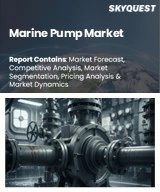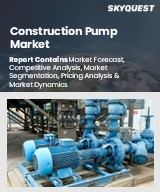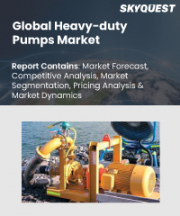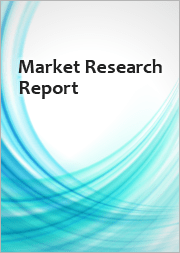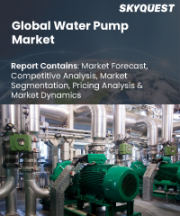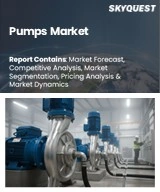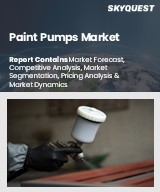
|
시장보고서
상품코드
1778886
용적식 펌프 재료 시장 - 세계 산업 규모, 점유율, 동향, 기회, 예측, 재료별, 펌프 유형별, 최종사용자별, 지역별, 경쟁별(2020-2030년)Positive Displacement Pumps Materials Market - Global Industry Size, Share, Trends, Opportunity, and Forecast, Segmented By Material Type, By Pump Type, By End User, By Region & Competition, 2020-2030F |
||||||
용적식 펌프 재료 세계 시장 규모는 2024년에 69억 2,000만 달러로 평가되었고, 예측 기간 중 연평균 복합 성장률(CAGR)은 6.53%를 나타낼 전망이며, 2030년에는 102억 1,000만 달러에 이를 것으로 예측됩니다.
| 시장 개요 | |
|---|---|
| 예측 기간 | 2026-2030년 |
| 시장 규모 : 2024년 | 69억 2,000만 달러 |
| 시장 규모 : 2030년 | 102억 1,000만 달러 |
| CAGR : 2025-2030년 | 6.53% |
| 급성장 부문 | 기어 펌프 |
| 최대 시장 | 아시아태평양 |
용적식 펌프 재료 시장은 용적식 펌프 제조에 사용되는 원료에 초점을 맞춘 산업용 펌프 산업 부문을 말합니다. 이 펌프는 일정량의 유체를 포집하고 펌프의 메커니즘을 통해 유체를 대체하는 방식으로 작동하기 때문에 고점도 유체, 슬러리 또는 정밀한 유량 제어가 필요한 응용 분야에 적합합니다. 이러한 펌프에 사용되는 일반적인 재료로는 스테인리스 스틸, 주철, 청동, 특수 합금, 열가소성 수지, 엔지니어링 폴리머 등이 있습니다. 각 재료는 화학적 호환성, 압력 처리, 내열성, 내마모성, 내열성, 내마모성 등의 요인에 따라 선택됩니다.
이 시장은 다양한 최종 사용 산업에서 신뢰할 수 있고 효율적인 펌프 시스템에 대한 세계 수요 증가로 인해 크게 성장하고 있습니다. 석유 및 가스 산업에서는 부식성 유체 및 극한의 압력을 견딜 수 있는 내구성 있는 소재에 대한 요구가 고성능 금속 및 합금의 사용을 촉진하고 있습니다. 마찬가지로, 화학 및 제약 부문에서는 비반응성으로 제품의 순도를 유지할 수 있는 스테인리스 스틸과 내식성 폴리머가 선호되고 있습니다. 수처리 및 폐수처리 산업도 큰 기여를 하고 있으며, 주철 및 열가소성 플라스틱과 같은 비용 효율적이면서도 견고한 소재에 대한 수요가 지속적으로 증가하고 있습니다.
또한, 에너지 효율과 지속가능성에 대한 관심이 높아짐에 따라 각 제조업체들은 우수한 강도와 환경 부하를 줄일 수 있는 가볍고 재활용이 가능한 소재를 통한 기술 혁신을 추구하고 있습니다. 복합재료 및 엔지니어링 플라스틱의 개발 등 재료 과학의 발전은 용적식 펌프의 범위와 기능을 확장하여 보다 다양하고 까다로운 조건에서 성능을 발휘할 수 있도록 하고 있습니다. 인프라 구축의 발전, 산업 공정의 자동화 발전, 엄격한 환경 규제는 시장 확대를 더욱 촉진하고 있습니다.
아시아태평양과 라틴아메리카를 중심으로 한 신흥 경제국의 급속한 산업화와 선진국의 기존 설비 현대화에 따라 고급 펌프 소재에 대한 수요는 꾸준히 증가할 것으로 예측됩니다. 산업계가 보다 내구성이 높고 효율적이며 지속 가능하고 진화하는 비즈니스 요구에 부합하는 펌프 솔루션을 찾고 있기 때문에 시장은 강력한 성장세를 보일 것으로 예측됩니다.
주요 시장 성장 촉진요인.
석유 및 가스 탐사 수요 증가
용적식 펌프 재료 시장은 원유 및 시추 진흙과 같은 고점도 유체를 고압 조건에서 처리하기 위해 용적식 펌프가 필수적인 석유 및 가스 탐사 부문 수요 증가에 의해 크게 견인되고 있습니다. 스테인리스 스틸, 듀플렉스강, PTFE 및 PEEK와 같은 첨단 폴리머와 같은 재료는 업스트림 탐사 및 생산에서 발생하는 부식성 환경, 마모성 유체 및 극한의 온도를 견딜 수 있는 펌프 부품의 제조에 필수적입니다.
특히 북미와 중동 등의 지역에서는 세계 에너지 안보의 추진으로 셰일층과 해저 유전의 시추 활동이 증가함에 따라 견고하고 내구성이 뛰어난 펌프가 요구되고 있습니다. 스크류, 기어, 스네이크 유형을 포함한 이 펌프는 가혹한 조건에서 작동 효율과 수명을 보장하기 위해 고성능 소재에 의존하고 있습니다. 수압파쇄와 같은 비전통 석유 및 가스 채굴 증가는 마모와 화학적 열화를 견딜 수 있는 재료의 필요성을 더욱 증가시키고 있습니다.
내식성 합금 및 복합 코팅과 같은 재료과학의 혁신은 펌프의 성능을 향상시키고, 최소한의 유지보수로 복잡한 유체를 처리할 수 있게 해줍니다. 석유 및 가스 공정에서 정확한 계량 및 안정적인 유량에 대한 수요는 특수 소재의 중요성을 강조하고 시장 성장을 가속하고 있습니다. 신흥국을 중심으로 전 세계 에너지 소비가 증가함에 따라, 용적식 펌프 재료 시장은 열악한 환경에서의 운전 요구 사항을 충족하기 위한 고품질 재료에 대한 의존도에 힘입어 지속적으로 확대될 것으로 예측됩니다.
국제에너지기구(IEA)의 보고서에 따르면, 2024년 세계 석유 생산량은 하루 1억 2천만 배럴에 달할 것이며, 비재래식 에너지원의 65%가 용적식 펌프를 필요로할 것입니다. 업계 생산량 추정에 따르면, 2024년에는 석유 및 가스용 펌프 제조에 1,800만 톤의 스테인리스 스틸과 200만 톤의 첨단 폴리머를 포함한 약 1,200만 톤의 특수 소재가 사용될 것으로 예측됩니다.
주요 시장 과제
첨단 소재의 높은 비용과 제조의 복잡성
주요 시장 동향
내식성 합금 및 복합재료 채택 증가
목차
제1장 개요
제2장 조사 방법
제3장 주요 요약
제4장 고객의 소리
제5장 세계의 용적식 펌프 재료 시장 전망
- 시장 규모와 예측
- 금액별
- 시장 점유율과 예측
- 재료별(주철, 스테인리스, 청동, 합금 재료, 열가소성 수지, 기타)
- 펌프 유형별(왕복 펌프, 로터리 펌프, 연동 펌프, 다이어프램 펌프, 기어 펌프, 스크류 펌프)
- 최종사용자별(석유 및 가스 산업, 물 및 폐수 처리 산업, 화학 산업, 식품 및 음료 산업, 제약 산업, 발전 산업, 기타)
- 지역별(북미, 유럽, 남미, 중동 및 아프리카, 아시아태평양)
- 기업별(2024년)
- 시장 맵
제6장 북미의 용적식 펌프 재료 시장 전망
- 시장 규모와 예측
- 시장 점유율과 예측
- 북미 : 국가별 분석
- 미국
- 캐나다
- 멕시코
제7장 유럽의 용적식 펌프 재료 시장 전망
- 시장 규모와 예측
- 시장 점유율과 예측
- 유럽 : 국가별 분석
- 독일
- 프랑스
- 영국
- 이탈리아
- 스페인
제8장 아시아태평양의 용적식 펌프 재료 시장 전망
- 시장 규모와 예측
- 시장 점유율과 예측
- 아시아태평양 : 국가별 분석
- 중국
- 인도
- 일본
- 한국
- 호주
제9장 중동 및 아프리카의 용적식 펌프 재료 시장 전망
- 시장 규모와 예측
- 시장 점유율과 예측
- 중동 및 아프리카 : 국가별 분석
- 사우디아라비아
- 아랍에미리트(UAE)
- 남아프리카공화국
제10장 남미의 용적식 펌프 재료 시장 전망
- 시장 규모와 예측
- 시장 점유율과 예측
- 남미 : 국가별 분석
- 브라질
- 콜롬비아
- 아르헨티나
제11장 시장 역학
- 성장 촉진요인
- 과제
제12장 시장 동향과 발전
- 인수합병(M&A)
- 제품 출시
제13장 기업 개요
- Grundfos Holding A/S
- Xylem Inc.
- Flowserve Corporation
- SPX Flow, Inc.
- ITT Inc.
- Alfa Laval AB
- IDEX Corporation
- Dover Corporation
- Ebara Corporation
- Sulzer Ltd.
제14장 전략적 제안
제15장 회사 소개 및 면책조항
LSH 25.08.05The Global Positive Displacement Pumps Materials Market was valued at USD 6.92 billion in 2024 and is expected to reach USD 10.21 billion by 2030 with a CAGR of 6.53% during the forecast period.
| Market Overview | |
|---|---|
| Forecast Period | 2026-2030 |
| Market Size 2024 | USD 6.92 Billion |
| Market Size 2030 | USD 10.21 Billion |
| CAGR 2025-2030 | 6.53% |
| Fastest Growing Segment | Gear Pumps |
| Largest Market | Asia Pacific |
The Positive Displacement Pumps Materials Market refers to the segment of the industrial pump industry that focuses on the raw materials used in manufacturing positive displacement pumps. These pumps work by trapping a fixed amount of fluid and displacing it through the pump's mechanism, making them ideal for high-viscosity fluids, slurries, or applications requiring precise flow control. Common materials used in these pumps include stainless steel, cast iron, bronze, specialty alloys, thermoplastics, and engineered polymers. Each material is selected based on factors such as chemical compatibility, pressure handling, temperature resistance, and wear tolerance.
This market is rising significantly due to the increasing global demand for reliable and efficient pumping systems across various end-use industries. In the oil and gas industry, the need for durable materials that can withstand corrosive fluids and extreme pressure is driving the use of high-performance metals and alloys. Similarly, in the chemical and pharmaceutical sectors, stainless steel and corrosion-resistant polymers are preferred due to their non-reactive nature and ability to maintain product purity. The water and wastewater treatment industry is another major contributor, where the demand for cost-effective yet robust materials like cast iron and thermoplastics continues to grow.
Additionally, the rising emphasis on energy efficiency and sustainability is encouraging manufacturers to innovate with lightweight and recyclable materials that offer superior strength and reduced environmental impact. Advancements in material science, such as the development of composite materials and engineered plastics, are also expanding the scope and functionality of positive displacement pumps, allowing them to perform in more diverse and challenging conditions. The growth of infrastructure development, increasing automation in industrial processes, and stringent environmental regulations further support market expansion.
With rapid industrialization in emerging economies, particularly in Asia Pacific and Latin America, and the modernization of existing facilities in developed regions, the demand for advanced pump materials is expected to rise steadily. The market is likely to see strong growth as industries seek more durable, efficient, and sustainable pumping solutions tailored to their evolving operational needs.
Key Market Drivers.
Increasing Demand from Oil and Gas Exploration
The Positive Displacement Pumps Materials Market is significantly driven by the escalating demand from the oil and gas exploration sector, where positive displacement pumps are critical for handling high-viscosity fluids, such as crude oil and drilling muds, under high-pressure conditions. Materials like stainless steel, duplex steel, and advanced polymers, such as PTFE and PEEK, are essential for manufacturing pump components that withstand corrosive environments, abrasive fluids, and extreme temperatures encountered in upstream exploration and production.
The global push for energy security, particularly in regions like North America and the Middle East, has led to increased drilling activities in shale and offshore fields, necessitating robust, durable pumps. These pumps, including screw, gear, and progressive cavity types, rely on high-performance materials to ensure operational efficiency and longevity in harsh conditions. The rise in unconventional oil and gas extraction, such as hydraulic fracturing, further amplifies the need for materials that resist wear and chemical degradation.
Innovations in material science, such as corrosion-resistant alloys and composite coatings, are enhancing pump performance, enabling them to handle complex fluids with minimal maintenance. The demand for precise metering and consistent flow in oil and gas processes underscores the importance of specialized materials, driving market growth. As global energy consumption rises, particularly in emerging economies, the Positive Displacement Pumps Materials Market is poised for sustained expansion, fueled by the sector's reliance on high-quality materials to meet operational demands in challenging environments.
The International Energy Agency reported that global oil production reached 102 million barrels per day in 2024, with 65% from unconventional sources requiring positive displacement pumps. Approximately 12 million tons of specialized materials, including 8 million tons of stainless steel and 2 million tons of advanced polymers, were used in 2024 for pump manufacturing in oil and gas applications, based on industry production estimates.
Key Market Challenges
High Cost of Advanced Materials and Manufacturing Complexity
One of the primary challenges in the Positive Displacement Pumps Materials Market is the high cost associated with sourcing and processing advanced materials. Materials such as stainless steel, titanium alloys, high-performance composites, and specialty polymers offer superior durability, corrosion resistance, and temperature tolerance. However, their extraction, refinement, and fabrication involve complex and energy-intensive processes that significantly drive up the overall cost of production. Manufacturers must invest in advanced casting, machining, and treatment technologies to meet strict quality and performance standards, further elevating capital expenditures.
This high material and production cost can limit market competitiveness, especially in price-sensitive industries such as water treatment or agriculture, where cost-efficiency often takes precedence over longevity or specialized performance. Small- and medium-scale pump manufacturers may find it financially unfeasible to integrate advanced materials into their product lines, leading to limited adoption across segments. Additionally, the requirement for specialized labor, tooling, and testing infrastructure adds to operational costs, posing a significant barrier to entry for new market players.
Furthermore, fluctuations in raw material prices, particularly metals and rare earth elements, driven by geopolitical tensions, supply chain disruptions, and trade policies, introduce cost volatility that affects planning and pricing strategies. This unpredictability can hinder long-term investment in material research and innovation. As industries increasingly demand high-performance pumps for aggressive media and high-pressure applications, balancing cost-effectiveness with performance becomes a persistent challenge. Without breakthroughs in cost-effective material alternatives or scalable production methods, the Positive Displacement Pumps Materials Market may face limitations in achieving broader penetration, particularly in emerging markets.
Key Market Trends
Rising Adoption of Corrosion-Resistant Alloys and Composite Materials
One of the most notable trends in the Positive Displacement Pumps Materials Market is the increasing preference for corrosion-resistant alloys and advanced composite materials. Industries such as oil and gas, chemical processing, and marine operations require materials that can endure highly corrosive fluids, fluctuating temperatures, and aggressive chemicals over prolonged periods. In response, manufacturers are shifting from traditional cast iron and basic stainless steel to more specialized alloys such as duplex and super duplex stainless steel, titanium, Hastelloy, and Inconel.
These high-performance metals provide exceptional resistance to pitting, crevice corrosion, and stress corrosion cracking, especially in chloride-rich and acidic environments. As positive displacement pumps are often exposed to extreme operational conditions, the reliability and longevity of these alloys significantly reduce maintenance costs and enhance equipment life cycles. Alongside metallic innovations, there is growing interest in non-metallic composite materials and advanced polymers. Fiber-reinforced plastics, polytetrafluoroethylene, and perfluoroalkoxy polymers are gaining momentum due to their excellent chemical compatibility, lightweight properties, and ease of molding into complex geometries.
This trend is further accelerated by the demand for energy-efficient and lightweight systems in sectors like water treatment, food and beverage processing, and pharmaceuticals. Composite materials reduce overall pump weight, which improves energy efficiency and reduces strain on pump components. However, manufacturers must balance material innovation with considerations of regulatory compliance, especially in hygiene-critical applications.
As research and development investment increases in material science, this trend is expected to expand further, offering greater customization, hybridization, and performance scalability. The transition toward corrosion-resistant alloys and composite materials highlights the market's focus on delivering durable, application-specific, and sustainable solutions to meet evolving industry requirements.
Key Market Players
- Grundfos Holding A/S
- Xylem Inc.
- Flowserve Corporation
- SPX Flow, Inc.
- ITT Inc.
- Alfa Laval AB
- IDEX Corporation
- Dover Corporation
- Ebara Corporation
- Sulzer Ltd.
Report Scope:
In this report, the Global Positive Displacement Pumps Materials Market has been segmented into the following categories, in addition to the industry trends which have also been detailed below:
Positive Displacement Pumps Materials Market, By Material Type:
- Cast Iron
- Stainless Steel
- Bronze
- Alloy Materials
- Thermoplastics
- Others
Positive Displacement Pumps Materials Market, By Pump Type:
- Reciprocating Pumps
- Rotary Pumps
- Peristaltic Pump
- Diaphragm Pumps
- Gear Pumps
- Screw Pumps
Positive Displacement Pumps Materials Market, By End User:
- Oil and Gas Industry
- Water and Wastewater Treatment Industry
- Chemical Industry
- Food and Beverage Industry
- Pharmaceutical Industry
- Power Generation Industry
- Others
Positive Displacement Pumps Materials Market, By Region:
- North America
- United States
- Canada
- Mexico
- Europe
- Germany
- France
- United Kingdom
- Italy
- Spain
- South America
- Brazil
- Argentina
- Colombia
- Asia-Pacific
- China
- India
- Japan
- South Korea
- Australia
- Middle East & Africa
- Saudi Arabia
- UAE
- South Africa
Competitive Landscape
Company Profiles: Detailed analysis of the major companies present in the Global Positive Displacement Pumps Materials Market.
Available Customizations:
Global Positive Displacement Pumps Materials Market report with the given market data, TechSci Research offers customizations according to a company's specific needs. The following customization options are available for the report:
Company Information
- Detailed analysis and profiling of additional market players (up to five).
Table of Contents
1. Product Overview
- 1.1. Market Definition
- 1.2. Scope of the Market
- 1.2.1. Markets Covered
- 1.2.2. Years Considered for Study
- 1.2.3. Key Market Segmentations
2. Research Methodology
- 2.1. Objective of the Study
- 2.2. Baseline Methodology
- 2.3. Key Industry Partners
- 2.4. Major Association and Secondary Sources
- 2.5. Forecasting Methodology
- 2.6. Data Triangulation & Validation
- 2.7. Assumptions and Limitations
3. Executive Summary
- 3.1. Overview of the Market
- 3.2. Overview of Key Market Segmentations
- 3.3. Overview of Key Market Players
- 3.4. Overview of Key Regions/Countries
- 3.5. Overview of Market Drivers, Challenges, and Trends
4. Voice of Customer
5. Global Positive Displacement Pumps Materials Market Outlook
- 5.1. Market Size & Forecast
- 5.1.1. By Value
- 5.2. Market Share & Forecast
- 5.2.1. By Material Type (Cast Iron, Stainless Steel, Bronze, Alloy Materials, Thermoplastics, Others)
- 5.2.2. By Pump Type (Reciprocating Pumps, Rotary Pumps, Peristaltic Pumps, Diaphragm Pumps, Gear Pumps, Screw Pump)
- 5.2.3. By End User (Oil and Gas Industry, Water and Wastewater Treatment Industry, Chemical Industry, Food and Beverage Industry, Pharmaceutical Industry, Power Generation Industry, Others)
- 5.2.4. By Region (North America, Europe, South America, Middle East & Africa, Asia Pacific)
- 5.3. By Company (2024)
- 5.4. Market Map
6. North America Positive Displacement Pumps Materials Market Outlook
- 6.1. Market Size & Forecast
- 6.1.1. By Value
- 6.2. Market Share & Forecast
- 6.2.1. By Material Type
- 6.2.2. By Pump Type
- 6.2.3. By End User
- 6.2.4. By Country
- 6.3. North America: Country Analysis
- 6.3.1. United States Positive Displacement Pumps Materials Market Outlook
- 6.3.1.1. Market Size & Forecast
- 6.3.1.1.1. By Value
- 6.3.1.2. Market Share & Forecast
- 6.3.1.2.1. By Material Type
- 6.3.1.2.2. By Pump Type
- 6.3.1.2.3. By End User
- 6.3.1.1. Market Size & Forecast
- 6.3.2. Canada Positive Displacement Pumps Materials Market Outlook
- 6.3.2.1. Market Size & Forecast
- 6.3.2.1.1. By Value
- 6.3.2.2. Market Share & Forecast
- 6.3.2.2.1. By Material Type
- 6.3.2.2.2. By Pump Type
- 6.3.2.2.3. By End User
- 6.3.2.1. Market Size & Forecast
- 6.3.3. Mexico Positive Displacement Pumps Materials Market Outlook
- 6.3.3.1. Market Size & Forecast
- 6.3.3.1.1. By Value
- 6.3.3.2. Market Share & Forecast
- 6.3.3.2.1. By Material Type
- 6.3.3.2.2. By Pump Type
- 6.3.3.2.3. By End User
- 6.3.3.1. Market Size & Forecast
- 6.3.1. United States Positive Displacement Pumps Materials Market Outlook
7. Europe Positive Displacement Pumps Materials Market Outlook
- 7.1. Market Size & Forecast
- 7.1.1. By Value
- 7.2. Market Share & Forecast
- 7.2.1. By Material Type
- 7.2.2. By Pump Type
- 7.2.3. By End User
- 7.2.4. By Country
- 7.3. Europe: Country Analysis
- 7.3.1. Germany Positive Displacement Pumps Materials Market Outlook
- 7.3.1.1. Market Size & Forecast
- 7.3.1.1.1. By Value
- 7.3.1.2. Market Share & Forecast
- 7.3.1.2.1. By Material Type
- 7.3.1.2.2. By Pump Type
- 7.3.1.2.3. By End User
- 7.3.1.1. Market Size & Forecast
- 7.3.2. France Positive Displacement Pumps Materials Market Outlook
- 7.3.2.1. Market Size & Forecast
- 7.3.2.1.1. By Value
- 7.3.2.2. Market Share & Forecast
- 7.3.2.2.1. By Material Type
- 7.3.2.2.2. By Pump Type
- 7.3.2.2.3. By End User
- 7.3.2.1. Market Size & Forecast
- 7.3.3. United Kingdom Positive Displacement Pumps Materials Market Outlook
- 7.3.3.1. Market Size & Forecast
- 7.3.3.1.1. By Value
- 7.3.3.2. Market Share & Forecast
- 7.3.3.2.1. By Material Type
- 7.3.3.2.2. By Pump Type
- 7.3.3.2.3. By End User
- 7.3.3.1. Market Size & Forecast
- 7.3.4. Italy Positive Displacement Pumps Materials Market Outlook
- 7.3.4.1. Market Size & Forecast
- 7.3.4.1.1. By Value
- 7.3.4.2. Market Share & Forecast
- 7.3.4.2.1. By Material Type
- 7.3.4.2.2. By Pump Type
- 7.3.4.2.3. By End User
- 7.3.4.1. Market Size & Forecast
- 7.3.5. Spain Positive Displacement Pumps Materials Market Outlook
- 7.3.5.1. Market Size & Forecast
- 7.3.5.1.1. By Value
- 7.3.5.2. Market Share & Forecast
- 7.3.5.2.1. By Material Type
- 7.3.5.2.2. By Pump Type
- 7.3.5.2.3. By End User
- 7.3.5.1. Market Size & Forecast
- 7.3.1. Germany Positive Displacement Pumps Materials Market Outlook
8. Asia Pacific Positive Displacement Pumps Materials Market Outlook
- 8.1. Market Size & Forecast
- 8.1.1. By Value
- 8.2. Market Share & Forecast
- 8.2.1. By Material Type
- 8.2.2. By Pump Type
- 8.2.3. By End User
- 8.2.4. By Country
- 8.3. Asia Pacific: Country Analysis
- 8.3.1. China Positive Displacement Pumps Materials Market Outlook
- 8.3.1.1. Market Size & Forecast
- 8.3.1.1.1. By Value
- 8.3.1.2. Market Share & Forecast
- 8.3.1.2.1. By Material Type
- 8.3.1.2.2. By Pump Type
- 8.3.1.2.3. By End User
- 8.3.1.1. Market Size & Forecast
- 8.3.2. India Positive Displacement Pumps Materials Market Outlook
- 8.3.2.1. Market Size & Forecast
- 8.3.2.1.1. By Value
- 8.3.2.2. Market Share & Forecast
- 8.3.2.2.1. By Material Type
- 8.3.2.2.2. By Pump Type
- 8.3.2.2.3. By End User
- 8.3.2.1. Market Size & Forecast
- 8.3.3. Japan Positive Displacement Pumps Materials Market Outlook
- 8.3.3.1. Market Size & Forecast
- 8.3.3.1.1. By Value
- 8.3.3.2. Market Share & Forecast
- 8.3.3.2.1. By Material Type
- 8.3.3.2.2. By Pump Type
- 8.3.3.2.3. By End User
- 8.3.3.1. Market Size & Forecast
- 8.3.4. South Korea Positive Displacement Pumps Materials Market Outlook
- 8.3.4.1. Market Size & Forecast
- 8.3.4.1.1. By Value
- 8.3.4.2. Market Share & Forecast
- 8.3.4.2.1. By Material Type
- 8.3.4.2.2. By Pump Type
- 8.3.4.2.3. By End User
- 8.3.4.1. Market Size & Forecast
- 8.3.5. Australia Positive Displacement Pumps Materials Market Outlook
- 8.3.5.1. Market Size & Forecast
- 8.3.5.1.1. By Value
- 8.3.5.2. Market Share & Forecast
- 8.3.5.2.1. By Material Type
- 8.3.5.2.2. By Pump Type
- 8.3.5.2.3. By End User
- 8.3.5.1. Market Size & Forecast
- 8.3.1. China Positive Displacement Pumps Materials Market Outlook
9. Middle East & Africa Positive Displacement Pumps Materials Market Outlook
- 9.1. Market Size & Forecast
- 9.1.1. By Value
- 9.2. Market Share & Forecast
- 9.2.1. By Material Type
- 9.2.2. By Pump Type
- 9.2.3. By End User
- 9.2.4. By Country
- 9.3. Middle East & Africa: Country Analysis
- 9.3.1. Saudi Arabia Positive Displacement Pumps Materials Market Outlook
- 9.3.1.1. Market Size & Forecast
- 9.3.1.1.1. By Value
- 9.3.1.2. Market Share & Forecast
- 9.3.1.2.1. By Material Type
- 9.3.1.2.2. By Pump Type
- 9.3.1.2.3. By End User
- 9.3.1.1. Market Size & Forecast
- 9.3.2. UAE Positive Displacement Pumps Materials Market Outlook
- 9.3.2.1. Market Size & Forecast
- 9.3.2.1.1. By Value
- 9.3.2.2. Market Share & Forecast
- 9.3.2.2.1. By Material Type
- 9.3.2.2.2. By Pump Type
- 9.3.2.2.3. By End User
- 9.3.2.1. Market Size & Forecast
- 9.3.3. South Africa Positive Displacement Pumps Materials Market Outlook
- 9.3.3.1. Market Size & Forecast
- 9.3.3.1.1. By Value
- 9.3.3.2. Market Share & Forecast
- 9.3.3.2.1. By Material Type
- 9.3.3.2.2. By Pump Type
- 9.3.3.2.3. By End User
- 9.3.3.1. Market Size & Forecast
- 9.3.1. Saudi Arabia Positive Displacement Pumps Materials Market Outlook
10. South America Positive Displacement Pumps Materials Market Outlook
- 10.1. Market Size & Forecast
- 10.1.1. By Value
- 10.2. Market Share & Forecast
- 10.2.1. By Material Type
- 10.2.2. By Pump Type
- 10.2.3. By End User
- 10.2.4. By Country
- 10.3. South America: Country Analysis
- 10.3.1. Brazil Positive Displacement Pumps Materials Market Outlook
- 10.3.1.1. Market Size & Forecast
- 10.3.1.1.1. By Value
- 10.3.1.2. Market Share & Forecast
- 10.3.1.2.1. By Material Type
- 10.3.1.2.2. By Pump Type
- 10.3.1.2.3. By End User
- 10.3.1.1. Market Size & Forecast
- 10.3.2. Colombia Positive Displacement Pumps Materials Market Outlook
- 10.3.2.1. Market Size & Forecast
- 10.3.2.1.1. By Value
- 10.3.2.2. Market Share & Forecast
- 10.3.2.2.1. By Material Type
- 10.3.2.2.2. By Pump Type
- 10.3.2.2.3. By End User
- 10.3.2.1. Market Size & Forecast
- 10.3.3. Argentina Positive Displacement Pumps Materials Market Outlook
- 10.3.3.1. Market Size & Forecast
- 10.3.3.1.1. By Value
- 10.3.3.2. Market Share & Forecast
- 10.3.3.2.1. By Material Type
- 10.3.3.2.2. By Pump Type
- 10.3.3.2.3. By End User
- 10.3.3.1. Market Size & Forecast
- 10.3.1. Brazil Positive Displacement Pumps Materials Market Outlook
11. Market Dynamics
- 11.1. Drivers
- 11.2. Challenges
12. Market Trends and Developments
- 12.1. Merger & Acquisition (If Any)
- 12.2. Product Launches (If Any)
- 12.3. Recent Developments
13. Company Profiles
- 13.1. Grundfos Holding A/S
- 13.1.1. Business Overview
- 13.1.2. Key Revenue and Financials
- 13.1.3. Recent Developments
- 13.1.4. Key Personnel
- 13.1.5. Key Product/Services Offered
- 13.2. Xylem Inc.
- 13.3. Flowserve Corporation
- 13.4. SPX Flow, Inc.
- 13.5. ITT Inc.
- 13.6. Alfa Laval AB
- 13.7. IDEX Corporation
- 13.8. Dover Corporation
- 13.9. Ebara Corporation
- 13.10. Sulzer Ltd.
14. Strategic Recommendations
15. About Us & Disclaimer
(주말 및 공휴일 제외)









